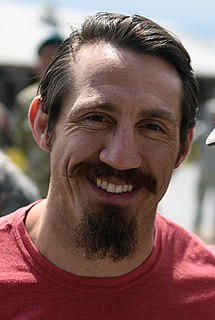A Quote by Tim Kennedy
I'm asked daily about how and why I don't have PTSD. I'm probably the last person on Earth you should ask about this stuff.
Related Quotes
People are always asking, "Is this person in front of me the same on the inside as he or she appears to be on the outside? Is there congruence between what's within that person and the words and actions I'm viewing and hearing externally?" Children ask that about their parents; students ask it about their teachers; parishioners ask it about their pastors and priests; employees ask it about their bosses; and in a democracy, citizens ask it about their political leaders.
I'm remembering how this works. How life doesn't have to be only anxiety about what's gone wrong or could go worng, and complaints about the world around you. How a person you're excited about can remind you there's stuff going on beyond... routine oil changes and homework. Stuff that matters. Stuff to look forward to.
There's always stuff to write about. So it's very gratifying on a lot of levels. This is stuff I got asked over and over again, or heard about. People would ask me about it, but they kind of knew the answer. It would be this ongoing question: "Your fans are wondering, now that you're married, are you still going to be able to write songs?" I'm serious! I would get asked that!
I'm surprised how often I'm asked about being a man with a woman narrator. I'm not the first, nor will I be the last. It's been done forever, but we seem to forget that. The whole notion of "write what you know" is not just boring, but wrong. Lately it seems like every novel has to be a memoir. I'm a boring person, but I'm a writer with a relatively vivid imagination. And when people ask me about how I find the voice of a woman, I tell them that my life is run by women.
How did I get into the world? Why was I not asked about it and why was I not informed of the rules and regulations but just thrust into the ranks as if I had been bought by a peddling shanghaier of human beings? How did I get involved in this big enterprise called actuality? Why should I be involved? Isn't it a matter of choice? And if I am compelled to be involved, where is the manager—I have something to say about this. Is there no manager? To whom shall I make my complaint?
The question I ask myself when adapting a book is how do I be true to the spirit and soul of the character? How would I describe this character in my medium? If you asked one person to do a painting of something and another to create a sculpture of it, you'll never ask, 'Why doesn't the painting look like the sculpture?'
When dealing with a difficult person, all that matters from a spiritual standpoint is how you react and treat the person. It's not about getting the other person to change or agree with you. Your spiritual growth is all about the way that YOU deal with the relationship, the person, and the situation. Even if the situation would justify you acting harshly, resist this temptation. Ask for heaven to purify and uplift your thoughts and feelings so that everything you do and say is aligned with Divine Love. This is the path and purpose of the lightworker. This is why you are here.
Natural history is not taught in seminary. This is curious, as most people in pastoral ministry are about 567 times more likely to be asked about cosmology or sub-nuclear physics or human biology or evolution than they are to be asked about irregular Greek verbs or the danger of the patripassionist heresy. If we monotheists are going to go around claiming that our "God made the heaven and the earth," it is not unreasonable to expect us to know something about what that heaven and earth actually are.
Don’t ask me those questions! Don’t ask me what life means or how we know reality or why we have to suffer so much. Don’t talk about how nothing feels real, how everything is coated with gelatin and shining like oil in the sun. I don’t want to hear about the tiger in the corner or the Angel of Death or the phone calls from John the Baptist.
A woman journalist in England asked me why Americans usually wrote about their childhood and a past that happened only in imagination, why they never wrote about the present. This bothered me until I realized why - that a novelist wants to know how it comes out, that he can't be omnipotent writing a book about the present, particularly this one.
I always find it kind of more interesting when people ask questions like, "What were you like as a kid?" Or just kind of personal history stuff, like, "What was the lowest point of your life?" Because that would be like, "Huh, well, I'd have to think about that one." And then give an honest answer. I think a lot of people don't want to give honest answers, or they just are in business showbiz mode when they're talking about stuff, so that's probably why a lot of that kind of thing doesn't get asked.
I do not see why the axiom of Prudence should not be questioned, when it conflicts with present inclination, on a ground similar to that on which Egoists refuse to admit the axiom of Rational Benevolence. If the Utilitarian has to answer the question, 'Why should I sacrifice my own happiness for the greater happiness of another?' it must surely be admissible to ask the Egoist 'Why should I sacrifice a present pleasure for a greater one in the future? Why should I concern myself about my own future feelings any more than about the feelings of other persons?'






































